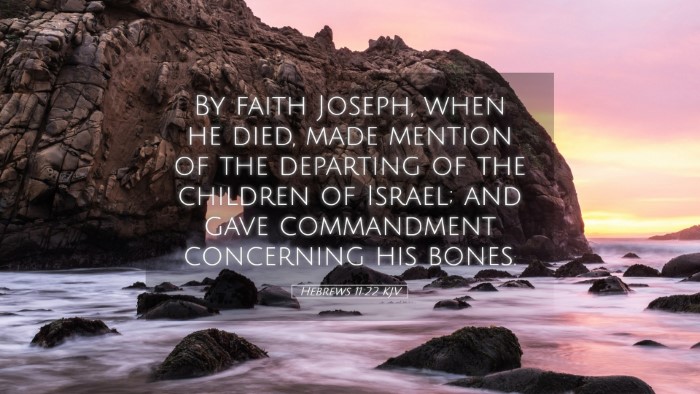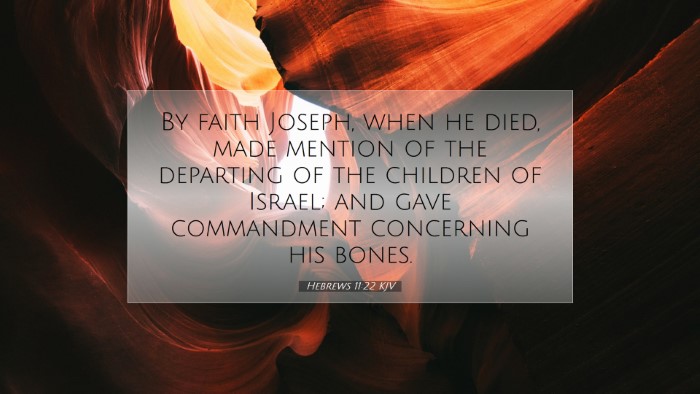Hebrews 11:22 Commentary
Hebrews 11:22 states: "By faith Joseph, when he died, made mention of the departing of the children of Israel; and gave commandment concerning his bones." This single verse encapsulates significant themes of faith, legacy, and the fulfillment of God's promises. Below, we explore insights from various Public Domain Commentaries.
Contextual Overview
The epistle to the Hebrews is a profound exploration of faith and endurance. Chapter 11, often referred to as the "Hall of Faith," illustrates various figures in biblical history who exemplified trust in God against all odds. Joseph's mention in this chapter highlights not only his personal faith but also reflects the collective faith of the Israelites in God's promise of deliverance.
Insights from Public Domain Commentaries
Matthew Henry's Commentary
Matthew Henry emphasizes the importance of Joseph’s faith at the time of his death. He notes that Joseph, despite the trials he faced, maintained a steadfast belief in God’s promise to bring the Israelites out of Egypt:
- Expectation of Deliverance: Joseph foresaw the exodus of the Israelites from Egypt, which implies a strong prophetic vision about God’s plans for His people.
- Command about His Bones: Henry points out that Joseph’s command concerning his bones signifies his unwavering trust in God’s promise of land (Canaan) to his forefathers. It shows his desire to be a part of God’s unfolding plan, even posthumously.
- Faith in Action: He notes that Joseph took practical steps to ensure his remains would be transported to Canaan, indicating that true faith results in tangible actions.
Albert Barnes' Notes on the Bible
Albert Barnes offers additional insights into the significance of Joseph's announcement about his bones:
- Prophetic Assurance: Barnes underscores the prophetic nature of Joseph’s act, viewing it as an assurance to his descendants that their bondage in Egypt was not permanent. Joseph’s faith created a legacy of belief for future generations.
- Symbolism of Bones: The act of demanding that his bones be transported is rich in symbolism. It signifies a connection to the Promised Land and serves as a tangible reminder of God's promises, ultimately illustrating the fulfillment of familial and covenantal obligations.
- Teaching for Future Generations: Barnes elaborates on how Joseph's declaration served as a teaching tool for future generations concerning the faithfulness of God. It was an encouragement that God would fulfill His promises to them.
Adam Clarke's Commentary
Adam Clarke brings a detailed analysis of Hebrew customs and the implications of Joseph’s faith in his commentary:
- Cultural Context: Clarke highlights the significance of burial practices in ancient Israel. For Joseph to specify the handling of his bones speaks volumes about his identity and hope in the resurrection of the people of Israel.
- Faith in God’s Covenant: He comments on Joseph’s faith in a covenantal God, leading to a ritualistic observance that would assure his descendants of their future return to Canaan. This aligns with the broader narrative of Israel’s bondage and eventual redemption.
- Legacy of Faith: Clarke also mentions how Joseph's faith contributed to a collective consciousness of hope among the Israelites, fostering a sense of continuity and connection with their heritage.
Theological Implications
Hebrews 11:22 raises important theological questions about faith, hope, and the continuity of God’s plan across generations:
- Faith as Assurance: This verse exemplifies faith as assurance in things hoped for, rooted in the promises of God and the belief that His word will not return void.
- Transgenerational Faith: The verse speaks to the notion of crafting a legacy of faith that transcends individual lifetimes, urging the faithful to instill hope and trust in future generations.
- God’s Faithfulness: Joseph’s command illustrates the profound faithfulness of God, inviting further reflection on how God's promises shape the identity of His people throughout history.
Application for Pastors and Theologians
This verse and its surrounding commentary provide rich material for theological reflection and practical application in ministry:
- Modeling Faith: Pastors can draw on Joseph’s story to encourage congregants to have steadfast faith in God’s promises, especially during trials or uncertainty.
- Teaching on Legacy: The importance of leaving a godly legacy influences teaching and preaching; leaders are reminded to instill faith in their disciples and congregants.
- Encouragement through Community: This commentary advocates for fostering a community that reinforces faith through shared experiences and collective memory of God’s faithfulness.
Conclusion
Hebrews 11:22 provides profound insights into the nature of faith, legacy, and the assurance found in God's promises. Through the reflections offered by public domain commentators like Matthew Henry, Albert Barnes, and Adam Clarke, readers gain a multifaceted understanding of Joseph's faith at the end of his life. The lessons gleaned from this scripture encourage believers to steadfastly trust in God's plans and to engage in actions that reflect their faith, leaving a rich legacy for future generations.


